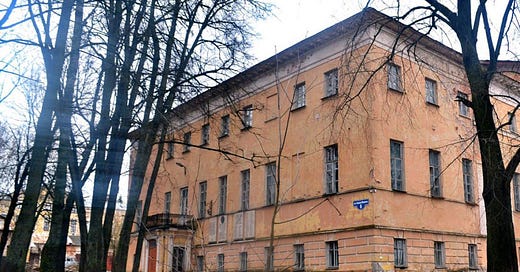They met. The deputy prime minister knows what he wants. Conflicting signals re omikron.
December 8, 2021
Nothing unexpected
The Putin-Biden talks lasted a little over two hours. What the Kremlin reported at the end fully confirmed my assessment: Putin was frightened by NATO’s current military activity near Russia’s borders and the prospect of Ukraine joining NATO; because Washington did not respond to his concerns, he demanded direct talks with the U.S. president.
The issues related to the internal Ukrainian crisis dominated the conversation... The Russian president used specific examples to illustrate Kyiv’s destructive policy aimed at dismantling the Minsk agreements and the agreements reached in the Normandy format...
Joseph Biden, for his part, emphasized the allegedly ‘threatening’ nature of Russian troop movements near Ukraine’s borders and outlined sanctions measures that the U.S. and its allies would be ready to apply in case the situation further escalated.
In response, Vladimir Putin stressed that responsibility should not be shifted on Russia’s shoulders, because NATO is making dangerous attempts to develop Ukrainian territory and build up military capabilities near Russia’s borders. Therefore, Russia is seriously interested in obtaining reliable, legally recorded guarantees ruling out NATO’s eastward expansion and the deployment of offensive weapon systems in Russia’s neighboring countries.
The leaders agreed to instruct their representatives to enter substantive consultations on these sensitive issues.” - Kremlin’s website reported.
In a White House briefing, Biden’s national security aide Jake Sullivan said that during talks, President Biden said he was ready to discuss Putin’s “strategic concerns”, but only after Russia proves by deeds that it has no intention to escalate tensions on the border with Ukraine. That was an approach welcomed by Putin’s aide, Yuri Ushakov, in a briefing after the call.
I assume Biden was able to calm Putin down a bit and that in the coming days/weeks, we will learn that a significant portion of the Russian troops concentrated along the Ukrainian border have changed their disposition and withdrawn to “winter quarters.” But suppose diplomats and the military do not start a meaningful dialogue around the required “security guarantees” in a few months. In that case, Russian military units will end their “winter hibernation” and reassemble near the Ukrainian border. And Putin will make Biden an offer he can’t refuse. To meet and to talk.
By the way
To quell the rumors, Vladimir Putin decided to demonstrate that his health allows him to make a one-day trip to India on the eve of critical talks with the U.S. president and hold a meeting with the government’s economic bloc.
We need growth
The meeting on economic issues was dedicated to discussing the outlook for 2022. In opening remarks, Putin outlined the obvious vital issues:
“In 2022, it is necessary to ensure a return of inflation to the target level of four percent... Its [price growth] main reason is the highly soft fiscal policy of several foreign countries, developed economies... the main emphasis is still to increase the supply of goods and services in the domestic market. First, it concerns food products... production and supply of meat, sugar, vegetables should significantly increase in 2022... We need to achieve growth in households’ real disposable income at a rate…not less than 2.5 percent... We have already agreed to expand support measures from the state as financial opportunities grow, based on federal budget resources... Our strategic goal in terms of personal income growth is... to increase the potential growth rate [of the economy]... I ask the government to analyze the major factors constraining the long-term growth of the domestic economy and to propose additional measures to increase its rates.”
On the one hand, everything is correct: It is impossible to raise the standard of living of Russians without accelerated growth, and inflation hits the low-income groups much harder. But, on the other hand, the main brake on the Russian economy is the aggressive foreign policy, which has led to technological isolation, and the lack of the rule of law. None of these problems can be solved by the efforts of finance and economy ministers, even if the central bank’s head joins them.
Conflicting signals
Once again, there are conflicting signals from the authorities about the pandemic. At a meeting in the government, Prime Minister Mikhail Mishustin says with concern that the decline in the number of cases has almost stopped. “The situation with the incidence of COVID in the country remains tense. According to last week’s results, an increase in the incidence of the disease was noted in 11 regions. The situation is complicated because a new strain of coronavirus has been detected in the world and has already been recorded in many countries. So far, it is not entirely clear how it will affect the overall picture. We must be prepared for any scenario.”
After which President Putin makes an unexpectedly calming statement: “... they [who????] say it [the Omicron variant] is not that harmful; I think some experts even call it a ‘live vaccine’... Anyway, there was some rebound in the markets; fears turned out to be premature about the new strain...”
The deputy prime minister knows what he wants
Russian Deputy Prime Minister Marat Khusnullin said the Ministry of Finance had found an original way to fight inflation by allocating 400 billion rubles to finance construction works scheduled for 2022-2023. According to him, this will make it possible to “save on inflation,”—i.e., pay at today’s prices.
Someone will say the Deputy Prime Minister does not understand that the additional demand will raise prices today. I will respond that in a period of high inflation, the one who gets the money first wins. And it seems that Marat Khusnullin understands this.
There should be no innocents!
The head of the Russian Investigative Committee (RIC), Alexander Bastrykin, held a meeting with the leaders of territorial bodies to discuss acquittals by Russian courts. He expressed dissatisfaction because the proportion of acquittals was too high. “This year 73,000 criminal cases were sent to courts against 82,000 defendants. Less than 1% of defendants have been acquitted,” the RIC said. [No mistake here: 1% is a high acquittance rate in RIC’s view]
Bastrykin named the reasons that led to such decisions. “First of all, it is the insufficient quality of investigative actions, especially at the initial stage of evidence collection, incomplete verification of arguments of criminal case defendants, and in some cases the protracted nature of the investigation.”
“Bastrykin directed the heads of investigative units to thoroughly analyze the grounds for acquittals... to promptly appeal against unlawful decisions,” the RIC reported.
I have analyzed many criminal cases involving economic disputes, and I agree with Bastrykin’s assessment: The investigators’ materials are often unconvincing and reflect the investigators’ lack of understanding of the essence of economic relations. But the conclusion I draw is precisely the opposite: With such quality of investigators’ work, the proportion of acquittals is deficient.
Notice, I do not even want to touch upon high-profile criminal trials, in which hundreds of political opponents of the Kremlin are subjected to criminal punishment without proof of any crime at all.
Does the train start moving?
On October 6, Vladimir Putin held a meeting on the fuel and energy complex situation, where, among other issues, he discussed Rosneft’s request to experiment with gas exports based on an agency agreement with Gazprom. Russian legislation makes Gazprom a monopoly in gas exports via pipelines, and years of attempts by other companies to enter foreign markets have been unsuccessful.
Perhaps this time Rosneft will be able to punch a hole in the wall erected by Gazprom and obtain permission to export 10 bcm per year. At least, President Putin has ordered the government to prepare the necessary documents for this. Rosneft’s decisive argument was that European regulation limits Gazprom’s ability to export gas using Nord Stream 2—one company could not get more than 50% of its capacity.
However, it is too early to say that Gazprom has given up its position: Proposals must be ready by March 1, 2022. The fact that the President’s order is not available on the Kremlin website suggests that the final decision will be made personally by Vladimir Putin. He has defended Gazprom’s interests very well for the past 22 years.
Russia under attack by amateurs
The vast majority (92%) of professional cyberattack attempts conducted in Russia in 2021 targeted critical-information infrastructure facilities, said Igor Lyapunov, Rostelecom’s vice president for cybersecurity.
According to his data, there were more than 300 attacks perpetrated by professionals in 2021, one-third more than the previous year. Most of the attacks were carried out by medium-skilled groups. Highly skilled groups accounted for 18% of the attacks. Highly qualified hackers were attracted by government agencies, energy, industry, and military-industrial complex enterprises.
Place your bets?
Having learned about the start of construction of the Hermitage branch in Moscow, the government of the Kaluga region (population 1 million, adjacent to the Moscow region to the Southwest) decided to revive the project of creating a branch of the same Hermitage in the regional center. The decision to make such a cultural center was taken back in 2015. Still, although Kaluga authorities have identified a building where it will be housed, there has been no progress in implementing this project so far.
However, it looks like it will take (at least) a few more months before the practical work starts: The governor of the region, Vladislav Shapsha, said it will happen after Kaluga and St. Petersburg sign an agreement on cooperation between the two regions in June 2022. The cost of the reconstruction of the historical building that will house the museum is 271 million rubles ($3.7 million). While in Moscow, the construction of the Hermitage branch will be financed by a private developer, in Kaluga, the relevant costs will be financed from the regional budget.
All right, let’s take bets: Who’s gonna go first?





